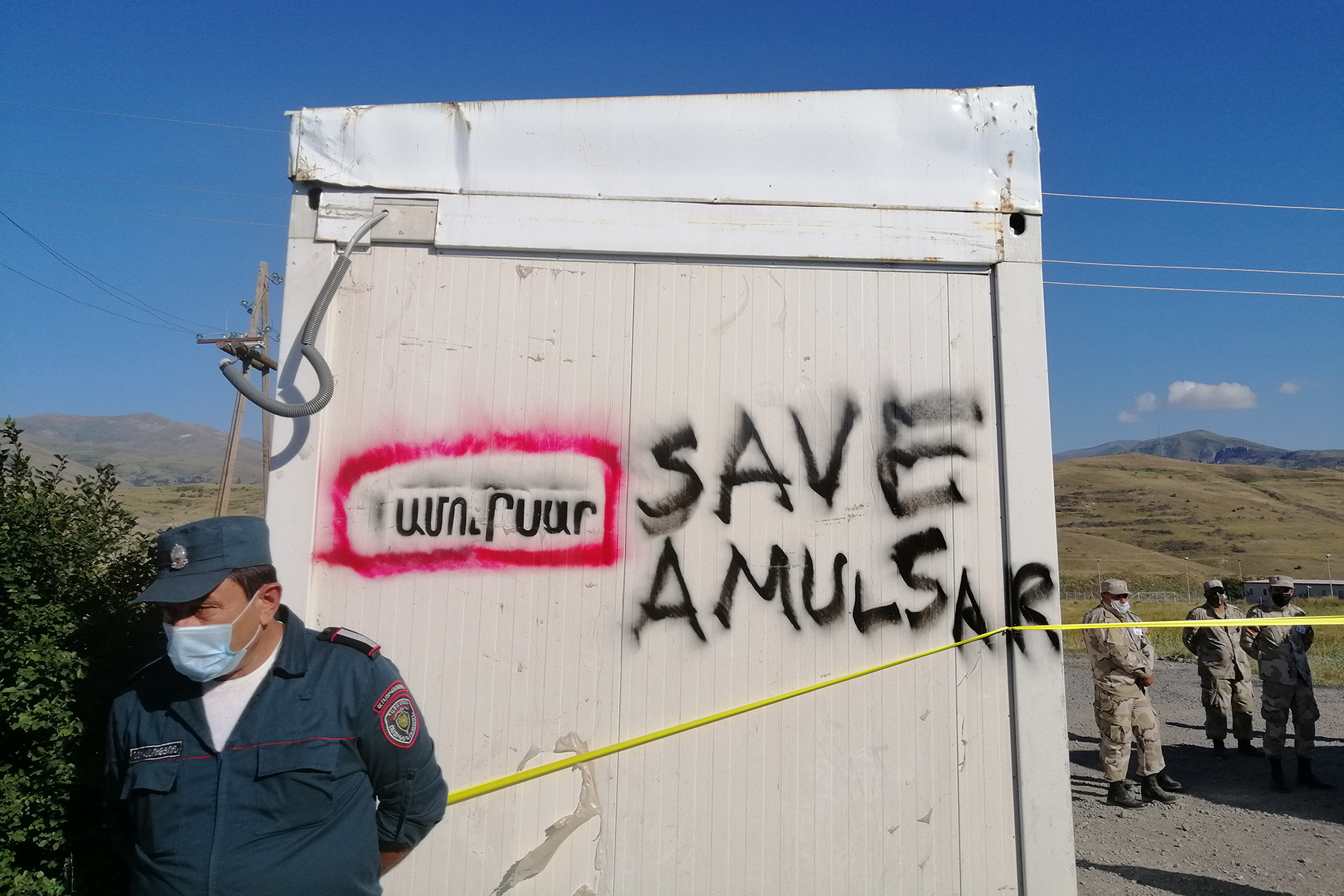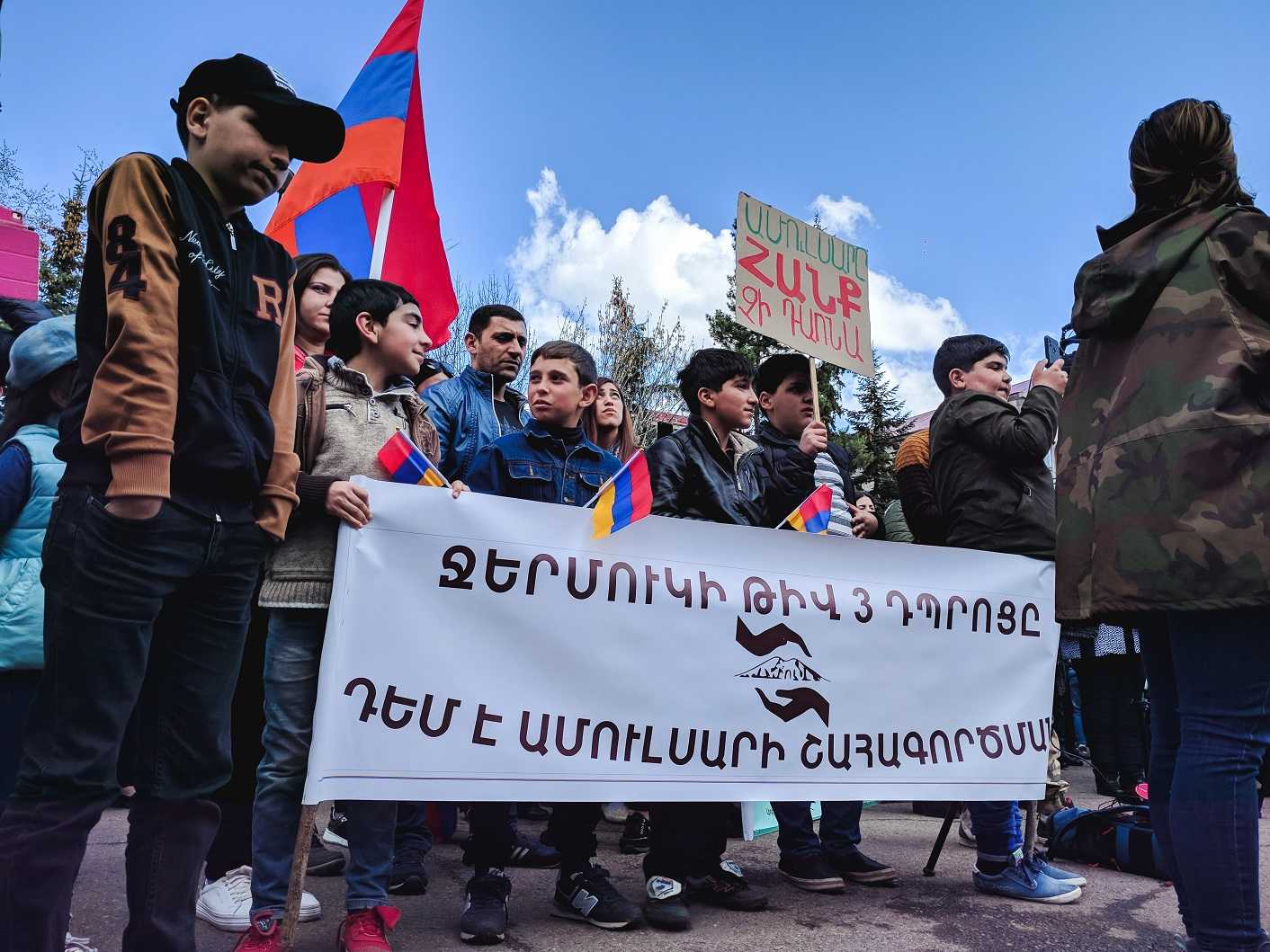
Protesters have clashed with police and private security outside the Amulsar Mine in Armenia after security guards dismantled a part of a blockade at the mine’s entrances.
On Monday night, mining company Lydian Armenia removed protesters’ cabins from two of the three entrances to the mine with cranes, replacing them with their own structures.
Lydian Armenia is a subsidiary of Lydian International, registered in the British tax haven of Jersey.
The blockade of the mine was organised by activists and local residents and has been in place since the summer of 2018. Supporters of the blockade have claimed that the Amulsar gold mine endangers the environment, the nearby resort town of Jermuk, as well as local villages.
By Tuesday afternoon, over a hundred local residents together with anti-mine activists arrived at the entrance to the mine to protest the cabins’ removal.
Several dozen police officers were also present as heated exchanges between Lydian security personnel and anti-mine protesters escalated into pushing, yelling, and throwing rocks and other projectiles.
Local media reported that 10 protestors and two Lydian security personnel were detained at the protest.
Environmental activists accused the police of using excessive force on peaceful protesters and called for the protests to continue peacefully.
The protests which erupted on Tuesday continued on Wednesday and Thursday, though they remained largely peaceful.
Lydian has threatened activists involved in the anti-mine protests with legal action.
Taking action
Lydian Armenia has stated that the protesters’ cabins were built illegally and that the blockade in front of the mine trespassed on land that belonged to the company. Opponents of Lydian have claimed that the local police had assured them that the exact area on which the cabins stood did not belong to Lydian.
The mining company has also accused local police of failing to enforce the law.
‘Lydian has avoided conflict for the past two years relying on the enforcement of the law’, they said in a statement. ‘Which has not taken place in the last two years.’
The company has stated that in July, they ‘received an expert opinion’ that argued the cabins were located on land owned by the company. They said the police had ‘ignored’ their requests to have the protestors and their cabins removed, and as a result, ‘Lydian removed the illegal property on its own’.
Tensions have been running high at the Amulsar mine for the past month.
On 1 July, armed employees of the Special Security Forces, a private security firm hired by Lydian, surrounded the cabins where activists were stationed demanding they leave.
Armenian investigative outlet Hetq reported that during the incident, Amulsar security ran over and killed three puppies that the activists had been caring for.
If access to the mine is restored, Lydian has said they will not immediately begin mining operations. ‘Numerous preparatory work has to be carried out to see if any property has been harmed and the company has to restore whatever has been harmed,’ Khoren Nasibyan, Head of Legal Affairs at Lydian Armenia told Azatutyun.
The newly-appointed Minister of Environment, Romanos Petrosyan, has stated he needs time to assess the situation at Amulsar and fully comprehend the issues at hand since for the past two years, he has not been involved in the processes revolving the mine.
Petrosyan has also stated that the mine can operate if all guarantees are made to ‘alleviate concerns’.
He also refrained from giving his opinion on Monday’s clashes arguing that they did not fall under the Ministry’s jurisdiction, but he insisted he was following the situation.

A troubled history
Lydian International was incorporated in 2007 in the British corporate tax-haven of Jersey. It’s only major active project so far has been the Amulsar mine, under construction since 2016.
Local residents and activists set up a blockade of the mine in the aftermath of the Velvet Revolution in 2018, citing concerns about environmental damage as well as the endangerment of Jermuk’s tourist economy.
Following the revolution, the new Armenian government hired Beirut-based environmental and water management consultancy group Earth Link and Advanced Resources Development (ELARD) to examine the mine and any potentially harmful environmental impact.
In August 2019, ELARD published its environmental impact assessment report which found that while the design concepts listed in Amulsar’s own environmental and safety impact assessment were ‘reasonable and appropriate […] a number of the measures and plans, are partial, not-sufficiently protective, and/or unreliable with a high degree of uncertainty’.
[Read more on OC Media: Pashinyan gives Amulsar mine the go-ahead despite critical environmental report]
Despite the critical report, Prime Minister Nikol Pashinyan called on the protestors to lift the blockade. However, Armenia’s authorities have not resorted to force or legal action.
Lydian has been unable to access the mining site and finish construction since 2018 and has faced financial difficulties. The company was delisted from the Toronto Stock Exchange in February 2020 and filed for court-protected restructuring. The restructuring was approved and the company has since come under new ownership, following which tensions at the mine escalated.







